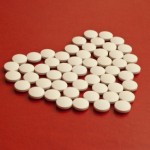Some years ago I began to take a baby aspirin a day as a cardiovascular event preventive medication. In my case, it was primary prevention. I've not had a cardiovascular event and don't have major risk factors. Most of my relative lived until their 90s; the only exception was my older brother who smoked three packs of cigarettes a day, gained 50+ pounds after age 40, didn't always take his blood pressure meds and loved foods that I don't consider as "heart-healthy/" When he died of a heart attack at age 57, I couldn't find his car; Dad said, "Look in the parking lot of the closest Kentucky Fried Chicken," and that's where it was.
Now I plan to stop my daily 81 milligram aspirin having read an article in JAMA which studied the incidence of major bleeding episodes (mostly in the brain or in the bowel) of over 185 thousand people who were taking low-dose aspirin compared to carefully matched controls who weren't.
The authors started with a 4.1 million population base in Italy where aspirin taken to prevent cardiovascular events is paid for by a government prescription plan for all at high risk. A six-year period was selected (start of 2003 to the end of 2008) and those over the age of 30 who began taking low-dose aspirin during that time frame were the study subjects. There were nearly 600,000 people considered for the study, but after appropriate exclusions just under a quarter million current aspirin users were carefully matched with control subjects. From a random sample of nearly 850,00 non-aspirin users, matches were found for 186,425.
I was impressed by the thoroughness of the statistical procedure using propensity scores ( a way to get apples matched with apples, not with zebras or even melons) and a "greedy-matching algorithm" (this link is only for math fiends) as another way to reduce bias. The results convinced me to stop taking my baby aspirin a day. The number of study subjects who had their first major bleed was fairly low (6,907 or 1.85% of all those in the study were hospitalized for a hemorrhagic event) and the absolute difference between aspirin users and controls weren't huge (5.58 per 1,000 person-years for those taking the drug versus 3.60 per 1,000 person-years in those who didn't take aspirin). But those numbers don't tell the whole story.
Men had considerably more bleeding episodes than women and older subjects had increased rates than younger ones. So as a 71-year-old man, I paid attention. I'm not diabetic, but noted that those who were had a higher risk of bleeding whether they took aspirin or not.
This wasn't a randomized controlled study, but its enormous size and careful methods were striking. The accompanying editorial by an MD, PhD from a university in Vienna looked at previous meta-analyses (lumped-together studies) and said that for a hypothetical large group of patents who took low-dose aspirin for secondary prevention, there was a 6 to 1 benefit-risk ratio. That supports giving the drug to people at high risk of a cardiovascular event.
But when you come to primary prevention, a similar large group of 10,000 could be expected to have 7 fewer cardiovascular events at the cost of 1 major bleed in the brain and 3 elsewhere. The odds are low enough that new guidelines in Europe don't recommend giving aspirin for primary prevention. This new study would certainly support that viewpoint.
I crossed off aspirin on my pill calendar.



